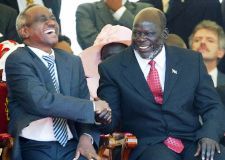Sudan’s war-weary southerners celebrate peace deal
By Opheera McDoom
JUBA, Sudan, Jan 9 (Reuters) – White peace flags fluttered from houses, shops and cars across this rundown regional capital of southern Sudan as people embraced and called for sweets to celebrate a deal ending 21 years of war with the north.

|
|
Sudanese vice president Ali Osman Mohammed Taha, left, and John Garang, chairman of the Sudanese People’s Liberation Army share a joke before they signed the Comprehensive Peace Agreement, Sunday, Jan 9, 2005 at Nyayo stadium in Nairobi, Kenya. (AP). |
Radios in homes and in Juba’s listless shops blared out the speeches of Sudanese leaders in Kenya on Sunday for the official signing ceremony of a peace deal southerners hope will bring development, trade and lift them from poverty.
“It’s done, let’s drink something, or have some sweets,” said Mohamed Ahmed to his friends sitting in his shop in Juba listening to the ceremony in the Kenyan capital Nairobi.
But years of war meant there were few sweets or drinks to be had, although the crowd shook hands and embraced each other.
Many were not aware of details of the deal in Juba between the government and the rebel Sudan People’s Liberation Movement (SPLM), but the idea of peace was enough to prompt celebrations.
Under the deal, southerners will vote on secession after a six-year interim period and the south will receive half of Sudan’s oil revenues, which mainly comes from southern fields.
“Today there is peace, so the bus ride should be free,” said Sandy Birra playfully as she got onto a bus in Juba, which will be the south’s administrative capital.
Women dressed in bright white wraps made their way down the dusty streets to the churches of this mainly Christian town, to attend a peace march to celebrate the signing.
The southern conflict broadly pitted the Islamist government in Khartoum against the mainly Christian or pagan south. Issues such as oil, ethnicity and ideology complicated the conflict.
Traders listened intently to news broadcasts, yearning for a revival in business across borders and between southern towns, where there are few tarmac roads and little infrastructure.
“I’m so happy because now we don’t have to fly our goods in, we can use the roads and everything will open up,” said 36-year-old trader Obeid Tito.
The town, close to the borders of Kenya, Uganda and the Democratic Republic of Congo, has been largely cut off from its key trading routes during fighting that claimed more than 2 million lives and forced more than 4 million from their homes.
Juba was an island of government control, while SPLM forces controlled most of the surrounding area. The Ugandan rebel Lord’s Resistance Army sporadically raided nearby villages.
But even in this isolated southern town, there were reminders that Sunday’s deal does not end another conflict that erupted in 2003 in Sudan’s western Darfur region and which has driven 1.6 million people from their homes.
Alim Ismail Abbas, originally from Darfur, said he hoped for better days in Juba and in his home region.
“We will get development here now, and the deal here should solve the problems in my area too,” he said.
In the Sudanese capital Khartoum, where many southerners fled in search of work during the years of fighting young southern men and women gathering around radios in the streets and prepared celebrations.
“We southerners have suffered a lot because of the war, from disease and displacement. We are happy there is peace and we hope that after peace there will be more work and equality for all citizens, whether from the north or the south,” said Korsheek Ayoum, a 35-year-old labourer from the south.
(With additional reporting by Khaled Abdel-Aziz in Khartoum)
